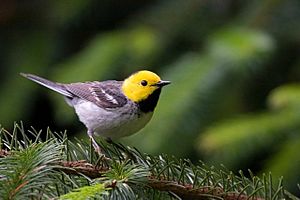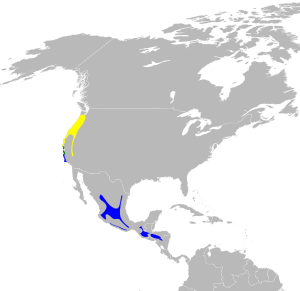Hermit warbler facts for kids
Quick facts for kids Hermit warbler |
|
|---|---|
 |
|
| Conservation status | |
| Scientific classification | |
| Genus: |
Setophaga
|
| Species: |
occidentalis
|
 |
|
| Range of S. occidentalis Breeding range Winter range | |
| Synonyms | |
|
Dendroica occidentalis |
|
The hermit warbler (Setophaga occidentalis) is a small perching bird. It is a species of New World warbler.
Measurements:
- Length: 5.5 in (14 cm)
- Weight: 0.3-0.5 oz (9-13 g)
- Wingspan: 7.9 in (20 cm)
Hermit warblers are dark gray in coloration on top, and white below, and their flanks are streaked with black. The wings have two diagonal white wing bars. The majority of the hermit warbler's head is yellow, and males have a dark black throat, while females have much less black on their throat bib and immature birds have no black throat.
Hermit warblers are common, but incredibly shy, birds that dwell in open coniferous forests. Their summer breeding range is the majority of the west coast of the United States up to Washington. They will sometimes winter in south-west California, but they are migratory and will winter in Central America as far south as Panama.
Nests are neat and cup-shaped, constructed from stems, grass, twigs, and pine needles positioned near the tip of a branch high in a conifer tree. The female will lay between 3 and 5 eggs, which are white in color and heavily spotted with brown and lilac speckles. Other incubation and nesting habits are mostly unknown.
Like most warblers the hermit warbler eats a strict diet of insects and spiders, and can often be found hanging upside-down from the ends of conifer branches, like a chickadee, probing for food.
See also
 In Spanish: Reinita cabecigualda para niños
In Spanish: Reinita cabecigualda para niños


